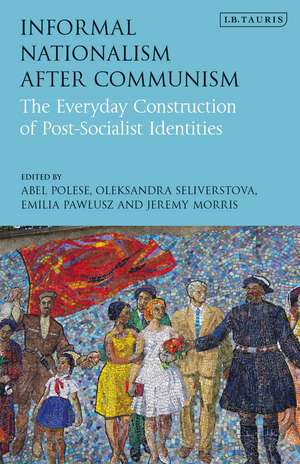Informal Nationalism After Communism: The Everyday Construction of Post-Socialist Identities
Editat de Abel Polese, Oleksandra Seliverstova, Emilia Pawlusz, Jeremy Morrisen Limba Engleză Paperback – 18 sep 2019
| Toate formatele și edițiile | Preț | Express |
|---|---|---|
| Paperback (1) | 229.32 lei 6-8 săpt. | |
| Bloomsbury Publishing – 18 sep 2019 | 229.32 lei 6-8 săpt. | |
| Hardback (1) | 596.81 lei 6-8 săpt. | |
| Bloomsbury Publishing – 19 mar 2018 | 596.81 lei 6-8 săpt. |
Preț: 229.32 lei
Preț vechi: 296.31 lei
-23% Nou
Puncte Express: 344
Preț estimativ în valută:
43.88€ • 45.72$ • 36.33£
43.88€ • 45.72$ • 36.33£
Carte tipărită la comandă
Livrare economică 03-17 aprilie
Preluare comenzi: 021 569.72.76
Specificații
ISBN-13: 9781838603830
ISBN-10: 1838603832
Pagini: 232
Dimensiuni: 138 x 216 x 18 mm
Greutate: 0.27 kg
Editura: Bloomsbury Publishing
Colecția I.B.Tauris
Locul publicării:London, United Kingdom
ISBN-10: 1838603832
Pagini: 232
Dimensiuni: 138 x 216 x 18 mm
Greutate: 0.27 kg
Editura: Bloomsbury Publishing
Colecția I.B.Tauris
Locul publicării:London, United Kingdom
Notă biografică
Abel Polese is a senior research fellow at Tallinn University. Oleksandra Seliverstova has just finished her PhD at the Free University of Brussels and Tallinn University (jointly awarded). Emilia Pawlusz is a Marie Curie fellow in the School of Governance, Law and Society at Tallinn University. Jeremy Morris is an associate professor at the School of Culture and Society, Aarhus University.
Cuprins
Introduction I. Informal Spaces1. Negotiating Identity in a Multi-Ethnic Classroom: Anthropological Explorations of Everyday School Practices in the Republic of Tatarstan, Russia - Dilyara Suleymanova2. The Estonian Way of Home-Making: Everyday Visions and Practices from the 1990s to 2000s - Anu Kannike3. Exploring the Link between National Identity and Perceptions of Citizenship in Georgia - Tinatin Zurabishvili, Tamar Khoshtaria, Natia MestvirishviliII. Consumption and Media Spaces1. Why Nations Sell: Reproduction of Everyday Nationhood through Advertising in Russia and Belarus - Marharyta Fabrykant2. The Moldovan Media: a Hotbed of Ntionalist Fervour - Onoriu Col?cel3. Turbofolk as a Means of Identification - Petra S?astnáIII. Border Spaces1. Ethnic and National Identity of Russian Estonians - Eva Sepping2. The National and the Religious among Greek Catholic Transcarpathian - Agnieszka Halemba3. Borders of a Borderland. "Everyday Identities" in the Context of Border Crossings - Ágnes Patakfalvi-Czirják and Csaba ZahoránIV. Public spaces1. "But now everywhere is the West:" Cultural Identity in East Berlin after 1989 - Mary Dellenbaugh2. Staging a Nation: Space and Identities in the Skopje Center - Vessela S. Warner3. Countryside Revisited: Ethno Villages and Nation-Building in Serbia - Irena SentevskaConclusion
Recenzii
Informal Nationalism after Communism is a captivating collection of papers, and an intriguing dialogue between schools and scholars, places and countries, perspectives and focuses, topic, generations and views. In my opinion, it is one of the most valuable recent publications on mundane national identities.
